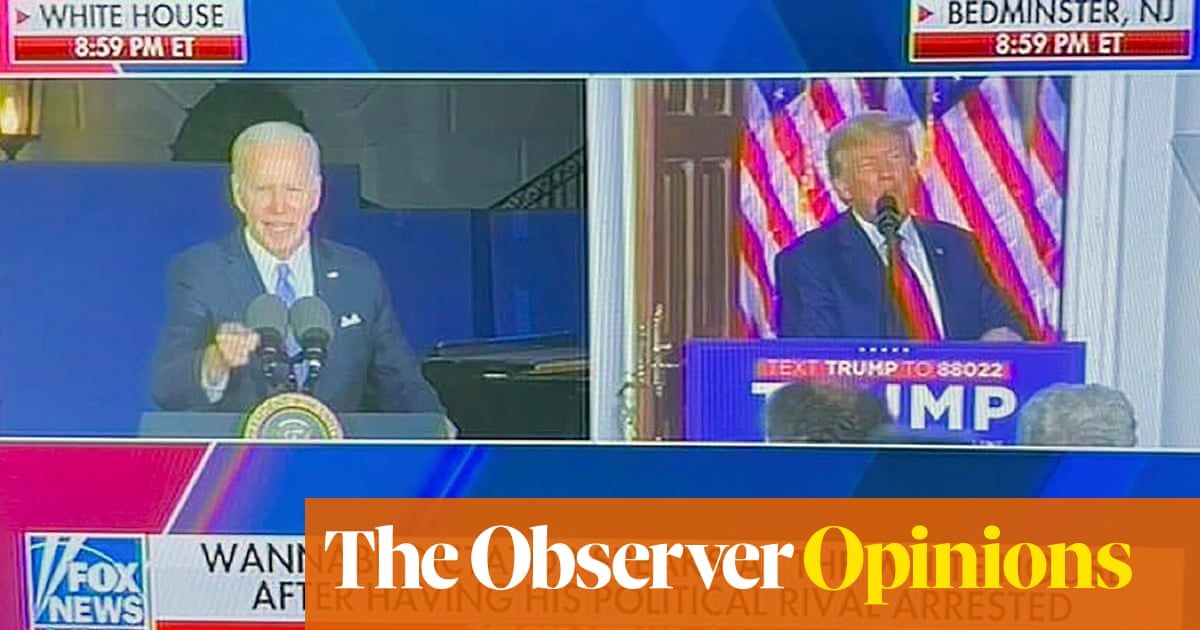
ne of the most important of the political arts is that of line-drawing: lines in the sand, party lines, lines to take at a press briefing. A well-drawn political line separates and unifies. It distinguishes your politics from others. It shows the values, issues and people you side with – and how far you would go to support them. It also helps to answer important questions, such as: “When he privately texts a businessman promising to fix a tax issue, what line is a prime minister crossing?”
The intensifying “stench of sleaze” engulfing Downing Street has turned into the sort of story beloved by those for whom politics is a profession and a hobby – especially now that Dominic Cummings has returned to the fray. For Labour, still trailing Boris Johnson by double digits, the return of “Tory sleaze” looks like a gift. The party has seized on the scandals as an opportunity to colour in the lines of a political sketch it has been working on for a year. It’s one that paints Keir Starmer as Jeeves to Johnson’s Wooster: the Tories drawn as lazy, unprofessional, careless in awarding government contracts; Labour pictured as people who do their homework, stay up late to read treaties all the way through, cautious with public money. The hope is that the magic phrase “Tory sleaze” conjures indelible links with the party’s past scandals: linking foreign aid to arms deals; cash for questions; and homes for votes.
Labour’s bet is that people will connect sleaze to broader concerns about Johnson’s competence and lifestyle. In contrast, Starmer will be confirmed as the trustworthy, safe choice. The danger is that all of this salacious briefing and counter-briefing – all the drama of Boris v Dom v Carrie – reduces the problem to the behaviour of individuals while tainting all politicians in Westminster, and amplifying the anti-politics sentiment that this government has already learned how to exploit. And it is a problem for Labour that anyone over 40 may remember that sleaze didn’t stop in 1997 and that “Tony’s cronies” paid cash for passports, cash for honours and cash for influence – while Tony Blair himself is on the TV news, saying that there is “nothing wrong” with lobbying.
Labour might need to take a bigger gamble than simply waiting around for Johnson’s government to crumble under its own scandals – and the opinion polls already suggest an opening. The latest British Social Attitudes survey finds that trust and confidence in British government are at a record low. Only 15% of us say we trust government all or most of the time, while 79% think that the way we are governed is in need of “a lot or a great deal of” improvement. On that leavers and remainers agree. It’s not that we think everything is always corrupt. It’s simply that when prime ministers, a current chancellor, senior civil servants and aides are all involved, it no longer looks like a breach of the rules. It looks like how the game is played. The line we draw doesn’t connect to high crimes and misdemeanours. It joins the dots between dodgy deals and dodgy dossiers.
Most of us, in all sorts of workplaces, know the rules about fair employment, putting contracts out for competitive tender and treating colleagues with respect. It’s not only the “left behind” who can see that Whitehall and Westminster have not quite caught up with the modern world.
Despite the forces of democratisation, British politics in the 20th century continued to practise what the political scientist Michael Moran described as “club government”. Politicians, civil servants, financiers, judges and the rest, shared a common culture. There was no need to write down rules to manage their relationships. Club members were by definition all good chaps. If needs be they could take care of their own.
This club culture is just one element of what political scientists call the “British political tradition”: the belief that politics is something only politicians can do; that good government is best when concentrated, strong and decisive, exercising the unconstrained sovereign power of the crown in parliament; and that the power of the people is best limited to distant oversight in the form of elections, the odd referendum or, in spectral form, via the opinion poll.
In this tradition, day-to-day politics is the business of those born or trained to steer the great ship Britannia. It is quite natural therefore to award posts, peerages and procurement contracts to people you know from school, university or your legal chambers. They know how to get things done. Bureaucratic rules get in the way when things need to be fast tracked.
However that tradition has been under pressure for a long time. The scandals of the 21st century are not only about the closed doors of the club; they are about the way the doors have been partially opened, and who benefits. To the idea that only the natural born or well-trained can govern has been added the belief that success in business is the standard against which all else can be judged. It follows that civil servants should study for MBAs, that the private sector gives the best advice to government, that public services should be privatised, contracted out or run as if for profit. As the prime minister himself said, only greed and the profit motive get things done.
The cosy club still exists, but its rules have been replaced with regulations written by the people they are meant to govern. David Cameron’s ties to Lex Greensill are just one example of the blurred lines between public government and private interests in education, health, prisons and more. The opportunities for opportunism are baked in to a cake that the public can’t have because others have already eaten it.
That is where the opposition should draw a line. It should be unafraid to be a little “populist”: for a renewed and modernised democracy; against old-fashioned, insiders-only chumocracy. In other words, Labour must resist the temptation to confine these scandals to a box marked “Tory sleaze”. The conservative press and commentariat will be happy running exciting stories of blue-on-blue backstabbing. If it all gets too much, “Boris” can be replaced by “Rishi” and business-as-usual continues.
If Labour wants to make the Conservatives uncomfortable, it needs to insist that the issue is not simply the moral failings of individuals. It is the institutions and procedures of our antiquated democracy. Too few people having too much power for far too long. Government procurement scandals are what you get when political and economic inequalities combine. The line Johnson has crossed separates democracy from oligarchy. Labour ought not to fear stepping up to it and pointing it out.
One of the things Brexiters were voting against was centralised, we-know-best, scratch-each-other’s-back government. What they have won – as Covid policy has demonstrated – is a recrudescence of culturally and geographically centralised power convinced it can manage everything and contemptuous of the expertise, insight and public spirit of people they didn’t go to university with. Labour should highlight and strengthen the lines that connect the 79% of us who think we can be governed better: counterweights to executive power; public oversight of those with private control of public services; regional political and economic powers; and a proper electoral system. It is not enough to be tough on sleaze – the opposition must be tough on the causes of sleaze.
Alan Finlayson is professor of political and social theory at the University of East Anglia.












